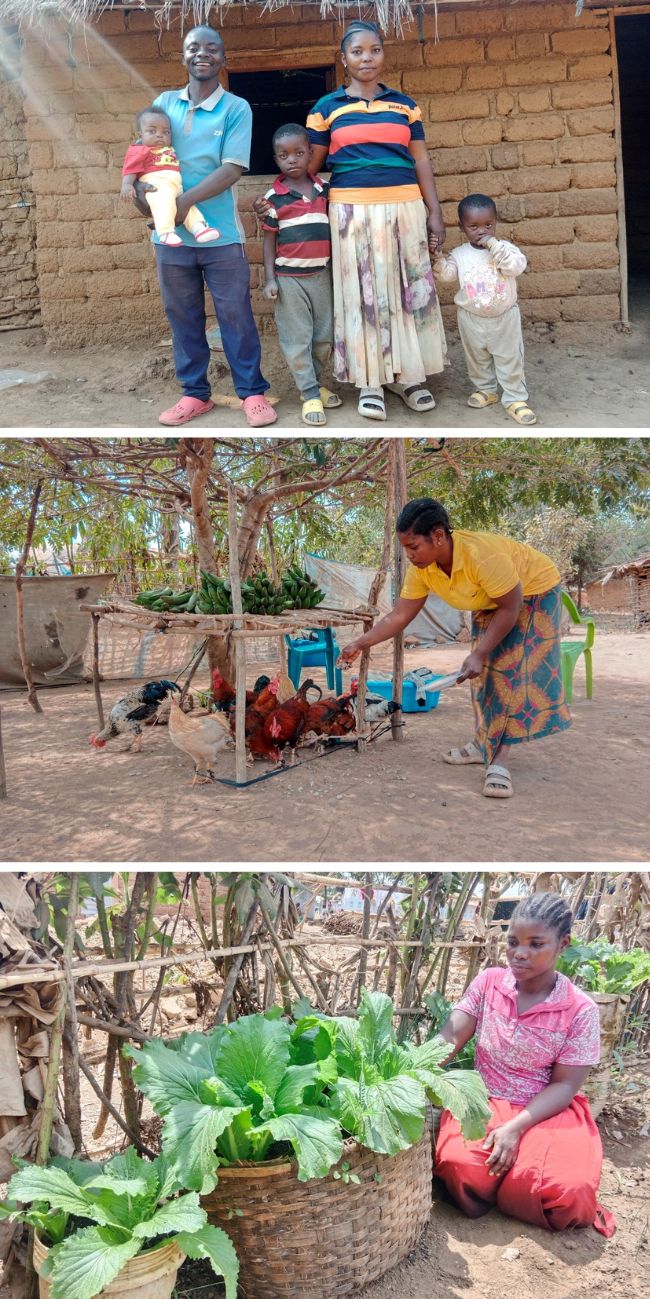Stories of Change

Top: Seluwa with her family Middle and Bottom: Seluwa with her chickens and crops
From Gardener to Entrepreneur: Seluwa Said’s Journey to Success
After fleeing conflict in the Democratic Republic of Congo, Seluwa Said and her family faced extreme hardship in Tanzania’s Nyarugusu Refugee Camp—until joining the CWS Sustainable Vegetable Farming Project, which empowered her to grow nutritious food, start a business and build a more secure future.
From Struggle to Survival in Nyarugusu Refugee Camp
Originally from the Democratic Republic of Congo, Seluwa Said was forced to flee her home due to ongoing conflict. In 2018, Seluwa arrived at the Nyarugusu Refugee Camp in Tanzania, in search for a safer future for herself and her family.
Along with her husband and three children, Seluwa faced significant hardships, including severe food shortages that forced them to survive on just one meal a day. She told us, “When we arrived at Nyarugusu Refugee Camp, we faced many challenges. First, we only had one meal a day, and even that was often delayed. We didn’t have any money to buy soap, clothes or school supplies for our children. Despite receiving support from various organizations, the situation remained difficult due to insufficient food and the lack of income-generating activities.”
In 2022, a transformative opportunity emerged when Seluwa joined the Sustainable Vegetable Farming (SVF) Project, implemented by Church World Service and funded by the Canadian Food Grain Bank and the Anglican Church of Canada’s PWRDF. This project has supported a total of 810 households in Nyarugusu Refugee Camp, significantly improving food security, nutrition and income for many families.
Empowered Through Sustainable Farming
Seluwa received comprehensive training in organic vegetable farming and was provided with essential agricultural inputs, including vegetable seeds, a hand hoe, a watering can, a rake, a hand sprayer pump, seven buckets of cattle manure and other necessary materials for establishing a kitchen garden.
With newfound knowledge and resources, Seluwa devoted herself to her kitchen garden, planting a variety of vegetables such as kale, amaranthus, Chinese cabbage, African nightshade and spinach. Her hard work paid off with a bountiful harvest, providing her family and neighbors with nutritious food and opening up opportunities for income generation.
From Kitchen Garden to Thriving Entrepreneur
Seeing the success of her vegetable garden, Seluwa decided to expand her venture by selling surplus vegetables within the camp. Her high-quality produce quickly earned her a reputation, and the income from these sales allowed her to start a small business selling essential household items. As her entrepreneurial spirit grew, her business began to thrive.
With the profits from her vegetable sales and small business, Seluwa made an investment in her family’s future by purchasing two chickens. This modest investment soon expanded to seven chickens, providing a steady supply of eggs and an additional source of income.
Throughout her journey, Seluwa received unwavering support from her husband, who has been a pillar of strength and encouragement. Together, they have worked tirelessly to secure a better future for their children.
Seluwa expressed her gratitude, saying, “My heartfelt gratitude to CWS for their incredible support through the Sustainable Vegetable Farming project. Your generous assistance has transformed my life and my family’s in ways I could never have imagined. Today, I am proud to call myself an entrepreneur. I have even expanded my efforts by raising chickens, which has further improved our financial stability. Thank you for believing in me; your work has made a profound impact on our lives, and we are deeply grateful for your kindness and dedication.”
We would like to thank our partners, the Canadian Foodgrains Bank and the Primate’s World Relief and Development Fund for allowing this assistance to be possible. You can learn about our programs in Tanzania here.
